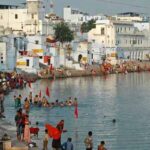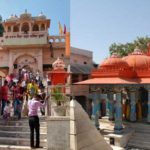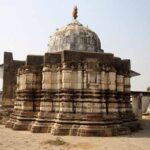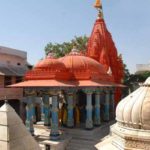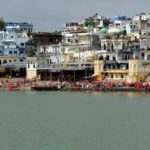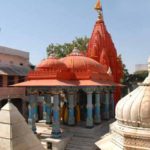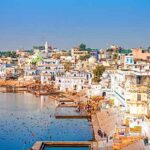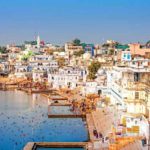Monuments in Pushkar, a sacred town in Rajasthan, India, is renowned for its spiritual significance and vibrant culture. While it may not boast towering monuments in the traditional sense, it houses several historically and culturally significant sites.
The most iconic structure is the Brahma Temple, dedicated to Lord Brahma, one of the few temples in the world devoted to this deity. Constructed with marble and stone slabs, this temple stands as a testament to ancient architecture and religious importance, Pushkar Tour Packages.
Another notable site is the Pushkar Lake, considered one of the holiest lakes in India. Encircled by around fifty ghats where pilgrims perform sacred rituals, this lake is believed to have been created by petals falling from Lord Brahma’s lotus. The lake and its ghats serve as the focal point for various religious ceremonies and festivals.
Adjoining the lake is the Savitri Temple, perched atop a hill. Accessible by a trek, it offers panoramic views of the town and the serene lake.
Although Pushkar may not boast grand monuments in the conventional sense, its spiritual ambiance, sacred sites, and architectural gems like the Brahma Temple make it a revered destination for pilgrims and tourists alike, offering a unique glimpse into India’s cultural and religious heritage Monuments in Pushkar.
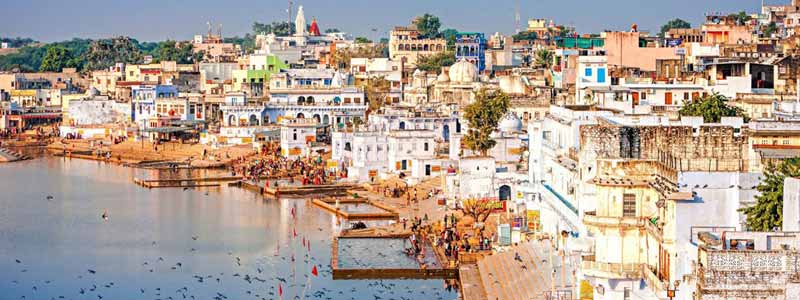
Pushkar Lake: Tirtha Raj – The King of Pilgrimage Sites
Pushkar Lake, nestled in the town of Pushkar, Rajasthan, India, is a sacred water body revered by Hindus for its mythological significance and spiritual aura. This ancient lake holds immense religious importance and is surrounded by around 52 bathing ghats and numerous temples.
Legend has it that the lake was formed when Lord Brahma, the creator in Hindu mythology, dropped a lotus flower while searching for a spot to perform a ritual. The lake is thus considered as holy as Brahma himself, making it one of the very few places where a temple dedicated to Brahma exists.
Pilgrims flock to Pushkar Lake to take a holy dip in its waters, believed to cleanse sins and bestow blessings. The devout believe that visiting this sacred lake during Kartik Poornima (full moon day in the Hindu lunar month of Kartik) holds exceptional spiritual significance Pushkar Attractions.
Surrounded by picturesque hills and embellished with captivating ghats and temples, Pushkar Lake is not only a religious site but also a scenic marvel. Its tranquil ambiance, especially during sunrise and sunset, captivates visitors, creating an atmosphere conducive to meditation and reflection.
Pushkar Lake stands as an emblem of faith, spirituality, and serenity, drawing travelers and devotees alike into its mystical embrace Monuments in Pushkar.
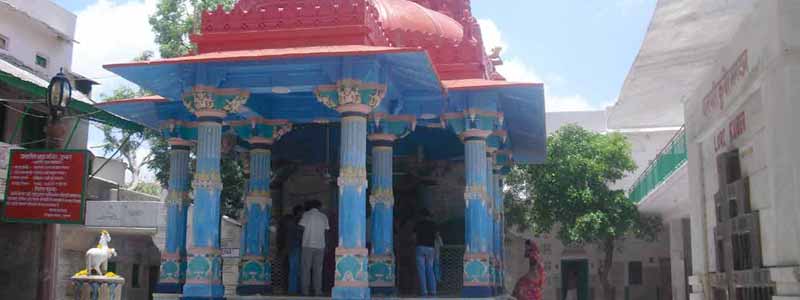
Brahma Temple: Unique Marvel Beyond Nangaparvat
The Brahma Temple in Pushkar, Rajasthan, is a revered Hindu shrine dedicated to Lord Brahma, the creator in the Hindu triumvirate. This temple stands as one of the very few temples in the world dedicated to Lord Brahma, making it a significant pilgrimage site for Hindus.
Constructed predominantly in marble and adorned with a red pinnacle, the temple’s architecture reflects an ancient style. The sanctum sanctorum enshrines a four-faced idol of Lord Brahma accompanied by his consort, Gayatri. The structure is adorned with intricately carved silver coins, showcasing the temple’s historical and spiritual significance.
Legend has it that Lord Brahma chose Pushkar as a site for his yajna (a ritualistic fire-sacrifice) and dropped a lotus flower, which resulted in the creation of the Pushkar Lake. Devotees believe that taking a dip in the holy Pushkar Lake and visiting the Brahma Temple washes away sins and bestows blessings.
The temple attracts devotees and tourists alike, not only for its religious importance but also for its architectural beauty and serene ambiance. The aura of spirituality and the devout atmosphere within the temple premises make it a must-visit destination for those seeking spiritual solace and cultural enlightenment in the vibrant tapestry of India’s religious heritage.
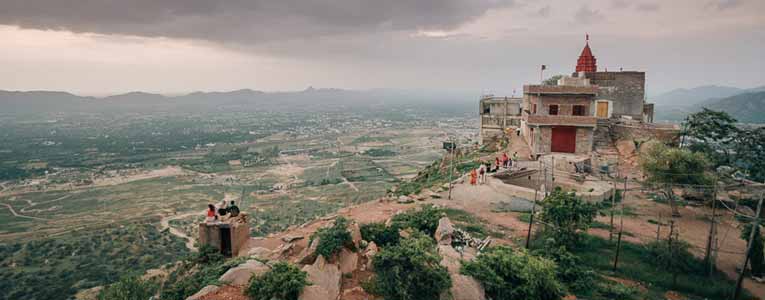
Savitri Temple: Panoramic Views and Mythological Connection
The Savitri Temple in Pushkar is a renowned Hindu temple dedicated to Goddess Savitri, situated atop a hill in the holy town of Pushkar, Rajasthan, India. This temple holds significant religious and mythological importance among devotees and tourists.
The temple is perched on the Ratnagiri Hill, offering panoramic views of the serene Pushkar town, the sacred Pushkar Lake, and the surrounding Aravalli hills. To reach the temple, pilgrims embark on a steep trek of around 1.5 kilometers from the base, which is an integral part of the spiritual journey for many visitors Monuments in Pushkar.
Goddess Savitri, the consort of Lord Brahma according to Hindu mythology, is worshipped here for her divine grace and blessings. Legend has it that Savitri Temple was constructed after a conflict between Lord Brahma and Goddess Savitri. The temple stands as a symbol of their divine union and reconciliation.
Apart from its religious significance, the Savitri Temple attracts travelers and photographers who seek breathtaking views of the sunrise and sunset. The serene ambiance and spiritual aura surrounding the temple make it a must-visit destination for both religious pilgrims and tourists seeking tranquility and scenic beauty in the vibrant town of Pushkar.
Rangji Temple: Blend of Architectural Styles
The Rangji Temple in Pushkar, India, stands as a captivating blend of architectural styles and religious significance, offering a unique glimpse into the town’s cultural heritage. Constructed in the 18th century, this temple is dedicated to Lord Rangji, an incarnation of Lord Vishnu.
The temple’s striking architecture fuses elements from South Indian Dravidian style, Rajput and Mughal architecture, showcasing a harmonious amalgamation of diverse artistic influences. Its high rising gopuram (gateway tower) adorned with intricate carvings and vibrant motifs immediately captures visitors’ attention, inviting them into its spiritual realm.
As one steps inside, the sanctum sanctorum houses the revered deity, Lord Rangji, flanked by idols of other Hindu gods and goddesses. The temple complex encompasses smaller shrines, sacred ponds, and pavilions, each contributing to the site’s sacred ambiance Monuments in Pushkar.
Devotees and tourists alike frequent the temple to partake in religious ceremonies and witness the elaborate rituals performed by the priests. Festivals like Holi and Janmashtami are celebrated here with great fervor, attracting devotees from various parts of the country.
Beyond its religious significance, the Rangji Temple serves as a historical and architectural marvel, preserving a rich tapestry of artistic expressions and spiritual beliefs, making it a must-visit destination for those exploring the cultural heritage of Pushkar.
Gurudwara Singh Sabha: Commemorating Guru Nanak and Guru Govind Singhji
The Gurudwara Singh Sabha in Pushkar is a serene and spiritually significant place for the Sikh community and visitors alike. Located in the heart of Pushkar, Rajasthan, this Gurudwara stands as a symbol of peace, unity, and equality Monuments in Pushkar.
The Gurudwara’s architecture beautifully reflects the traditional Sikh style, featuring domes, arches, and intricate designs. Its tranquil surroundings and the melodious recitation of hymns from the Guru Granth Sahib, the holy scripture of Sikhism, create a serene atmosphere for prayer and meditation.
Devotees from different walks of life, irrespective of caste, creed, or religion, gather here to offer their prayers, seek blessings, and partake in the langar, a free community kitchen that serves food to all visitors. This practice of langar embodies the Sikh principle of seva (selfless service) and equality by providing a meal to anyone in need, fostering a sense of unity and brotherhood among all.
The Gurudwara Singh Sabha also engages in various community welfare activities, including educational programs, medical camps, and social initiatives, contributing positively to the local community and beyond Monuments in Pushkar.
Visiting the Gurudwara Singh Sabha in Pushkar is not just a religious experience but also an opportunity to witness the values of compassion, equality, and service that are integral to Sikhism.
Pap Mochini Temple: Respite from Cardinal Sins
The Pap Mochini Temple, nestled in the serene town of Pushkar, Rajasthan, stands as a revered spiritual site known for its significance in Hindu mythology and its tranquil ambiance. The temple, dedicated to the Goddess Gayatri, holds a prominent place among pilgrims and devotees who visit to seek blessings and absolution from their sins, as “Pap Mochini” translates to “Redeemer of Sins.” Monuments in Pushkar
Situated atop the Ratnagiri Hill, the temple offers a breathtaking panoramic view of the picturesque Pushkar Lake and the surrounding Aravalli Range. Its location adds to the spiritual experience, as devotees ascend the hill through a series of steps, immersing themselves in prayer and meditation while relishing the natural beauty.
Legend has it that taking a dip in the holy Pushkar Lake followed by a visit to the Pap Mochini Temple absolves one of their sins, granting them spiritual cleansing and rejuvenation Monuments in Pushkar.
The temple’s architecture, adorned with intricate carvings and designs, showcases the rich cultural heritage of Rajasthan. Visitors not only seek spiritual solace but also marvel at the craftsmanship evident in the temple’s construction.
The serene atmosphere coupled with the awe-inspiring vista makes the Pap Mochini Temple a must-visit destination for spiritual seekers and tourists alike, offering a profound experience of divinity, tranquility, and architectural splendor amidst the rustic charm of Pushkar.
Varaha Temple: Ancient Abode of Lord Vishnu
The Varaha Temple in Pushkar, Rajasthan, stands as a significant architectural marvel and a revered religious site. Dedicated to Varaha, the third incarnation of Lord Vishnu in the form of a boar, this temple carries immense spiritual and cultural importance among Hindu devotees Monuments in Pushkar.
Located near the sacred Pushkar Lake, this ancient temple showcases intricate architectural details typical of North Indian temple design. Its structure, adorned with carvings and sculptures, reflects the rich heritage and artistic finesse of the bygone eras.
The primary sanctum of the Varaha Temple houses a magnificent idol of Varaha, depicting the deity in a boar incarnation. Devotees flock to this shrine to seek blessings, especially those seeking relief from sins or wishing for prosperity and protection.
The temple also serves as a testament to the religious diversity of Pushkar, where various faiths and beliefs coexist harmoniously. Visitors not only admire the architectural grandeur but also immerse themselves in the spiritual aura, experiencing the tranquility and reverence that permeate the surroundings.
During festivals and special occasions, the Varaha Temple becomes a hub of vibrant celebrations, drawing devotees and tourists alike to partake in the festivities and rituals, further enhancing its allure and cultural significance in the heart of Monuments in Pushkar.
How to Reach Pushkar
Pushkar, a serene town nestled in the Ajmer district of Rajasthan, India, boasts cultural richness and spiritual significance. Here are various ways to reach Monuments in Pushkar:
By Air: The closest airport to Pushkar is the Jaipur International Airport, approximately 150 kilometers away. From there, you can hire a taxi or take a bus to reach Pushkar. The drive takes around 2.5 to 3 hours.
By Train: Ajmer Junction serves as the nearest railway station to Pushkar, located just 11 kilometers away. Ajmer is well-connected to major cities like Delhi, Mumbai, Jaipur, and others. From the station, taxis, auto-rickshaws, or buses are readily available to reach Pushkar.
By Road: Pushkar enjoys good road connectivity. State-run buses, as well as private buses, ply regularly from nearby cities like Jaipur and Ajmer. National Highway 48 passes close to Pushkar, making it easily accessible by road. Many tourists also prefer hiring taxis or driving their own vehicles to reach Pushkar, enjoying the picturesque journey through the Aravalli hills.
Local Transport: Within Pushkar, transportation options include auto-rickshaws, cycle-rickshaws, and taxis. The town itself is relatively small and most places of interest are within walking distance from each other.
Important Note: During the renowned Pushkar Camel Fair held annually (usually in November), the town witnesses an influx of tourists. It’s advisable to plan travel and accommodation well in advance during this time due to the high demand Monuments in Pushkar.
Travelers visiting Pushkar not only cherish the town’s spiritual ambiance but also revel in its vibrant culture, scenic beauty, and the sacred Pushkar Lake, making it a must-visit destination in Rajasthan’s cultural landscape.

